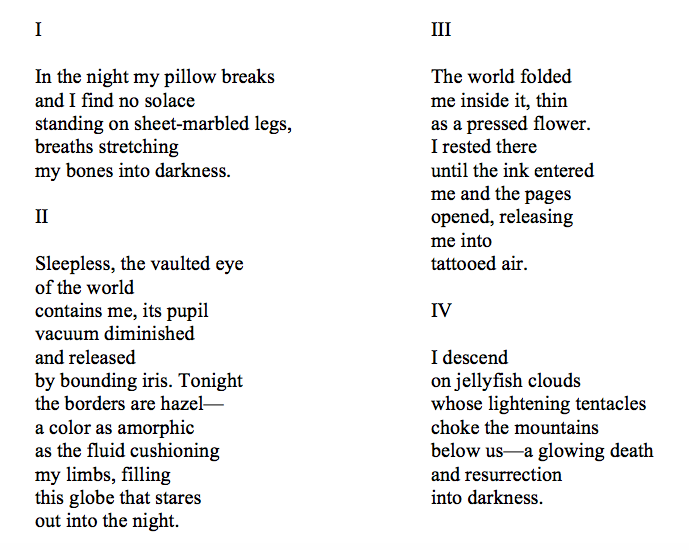Shelly Bryant’s English translation of this poem was first published in the programme notes of A Melody named Memory, an event on October 7, 2017 as part of The Arts House’s Poetry with Music series.
Kallang River
There is a river
flowing quietly
– One –
flowing so hesitantly
a river, dragon claws extended
from north to south, its banks spread wide
day and night, its low sob
in the memories of our ancestors
sticking like the colour of skin
how many dreams call him back
how many days, deeply entrenched
in the sediment on each bank
water level rising
with each drink of sweat and tears
a whirlpool swirls, looking for a way out
never seeing a thousand miles of majesty
a river, history telling him that it should return
to the colour of the earth
day and night, becoming a scene of hope
that river, beneath my feet and in my heart
belonging to the memories of the past
without reeds, the whitened banks remain fertile
my glorious river
irrigate me, wash me, that river
in my youth I did not know to build a wall around it
once it is allowed to move out into the South China Sea
it never returns to its old dreams
turbulent river
each whirl turns a muddy disk
the river returns
from the naked youth, home to fish and shrimps
it shrinks into a solitary vine, a song creeping on a tiny map
the history book’s final chapter, silently
whispers
at rest
misfortune is still fortune, misfortune or fortune
the roots of an entire history stationed there
the footprints of the Kallang people
the drifting shadow of a Bugis man
the fishing nets of our ancestors
Raffles’ fleet swept past
the blood from the Japanese warrior’s blade
all have been cleansed here
today, leave no more
a trace
last night, a heavy machine’s frame
in the river, amidst the water’s roar
in the tunnel of time
making big changes for you, a complete facelift
that rough iron wrist
thousands of twists and turns leading you
night or day, along these banks and outward
– giving you new life –
to the bitter sea
– Two –
after a light rain
anchored to the bridge
so many years! coming and going
never stopping for a minute to think. Behind
behind is a stone lion
before green waters and blue skies
soft current, calm breeze, solitary man-made rainbow
and yesterday, the scene on both sides so different
yesterday, we leaned on the rail, consuming sweet potatoes
on the left a boatful of rubber, sailed southwards to thriving warehouses
on the right, a tongkang full of boxes started from the UOB Bank warehouse
we squatted on the shoreline releasing and retracting the line
from noon till dusk
from ABCs to PSLE
we ride the stone lion for a photo of our P6 graduation
a cheap camera leaves behind a stack of hazy memories
such as red eggs and coarse rattan
such as Triple 5 cigarettes and comics
such as pulling braids and throwing cockroaches
such as Oriental Red and hymn class
such as struggle and conflict
such as hungry and not hungry
such as ought
and ought not
but what about earlier
an earlier time
at high tide when we caught black shrimps and fingernail clams at tide’s ebb
at noon the rubber factory bell sounds, some
ate and some went to class
we sang of Liu Sanjie and eating green bean soup
bare-butted bathing in the river and playing in the mud
one day members of the Black Ox Party rushed over, then hurried away
one day a fire burned, purging our youthful dreams
we shed tears
and prayed for rain
rain fell on the heart of our yesterdays, and
the bridge of today. On the river
the bridged banks, the lush weeds
stone pier on either side, the fishing boat here no more
leaning on the rail, what should we recall?
the bustle of cars on the bridge
beneath the bridge, the thick waters
coated with a rainbow of grease
flowing waters move toward the past
flowing time grows mouldy before me. Look around
behind me, only a few columns of Bugis Village remain
before me, Marina City waves to me
should I go?
on the riverside, two chairs
with rain and dust, let me sit
and quietly recall. This river
was the longest green shore, and here
lies my first dream…
27 October 1986
from Xi Ni’er’s Kidnapped Years, 1989

